What is the calorie content of mango and what are its benefits and harms
Mango is a popular exotic fruit called "royal" in India. Mango trees are grown on an industrial scale in Asia, South America, several African countries and even Europe (for example, in the Canary Islands, which are part of Spain). An imported product is often found on the shelves of domestic stores. We will tell you in more detail how the fruit is useful, whether its use does not harm the figure and how to choose a ripe, juicy and tasty mango.
The content of the article
Calorie content, BJU and glycemic index
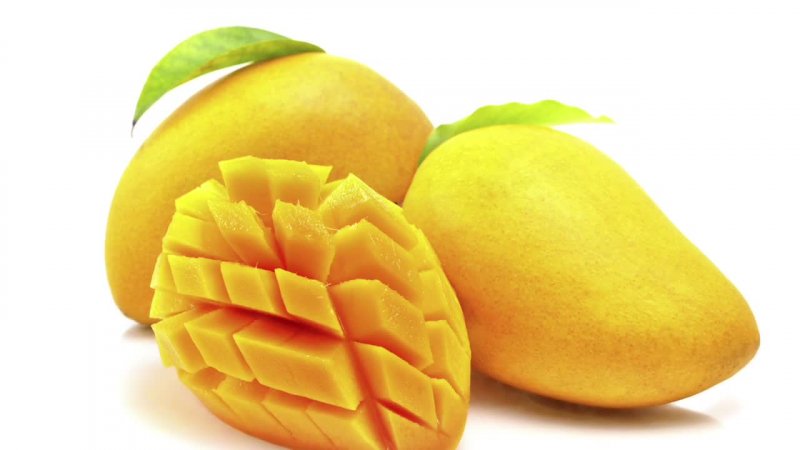
100 g of fresh fruit contains:
- 60 kcal;
- 0.8 g of proteins;
- 0.4 g fat;
- 13.4 g carbohydrates;
- 1.6 g fiber;
- 83 g of water.
The glycemic index is 55 units - The fruit contains enough simple carbohydrates to cause a spike in blood glucose. This is the borderline between medium and low GI. And although the product is not dangerous for people with diabetes, it is still not recommended to use it in large quantities.
The carbohydrate composition of a ripe fruit and an unripe one differs:
- as it ripens, the starch contained in the fruit turns into sucrose, maltose and glucose - hence the sweet taste of the product;
- green mango is rich in pectin, a complex carbohydrate - as soon as a hard shell is formed, the amount of this substance decreases.
Ripe mango is made up mostly of simple, fast-digesting carbohydrates. Unripe fruit contains more dietary fiber, but due to the high content of acids (citric, oxalic, malic and succinic) and lack of sugars, its taste is low.
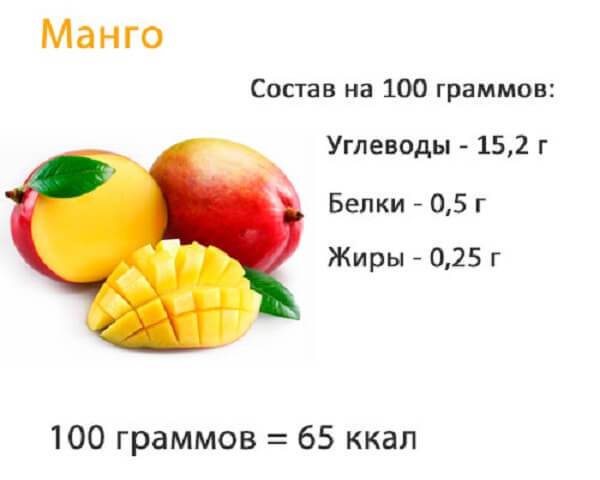
Vitamin and mineral composition
What vitamins are contained in 100 g of pulp:
- A - 54 μg (including beta-carotene - 0.64 mg);
- B1 - 0.028 mg;
- B2 - 0.038 mg;
- B4 - 7.6 mg;
- B5 - 0.197 mg;
- B6 - 0.119 mg;
- B9 - 43 mcg;
- C - 36.4 mg;
- E - 0.9 mg;
- K - 4.2 μg;
- PP - 0.67 mg.
In the aroma and taste of unripe mango, a carrot note is clearly felt. And this is not a coincidence at all - both products are rich in carotene (provitamin A), a pigment that gives the characteristic orange color.
Mango contains few minerals per 100 g:
- potassium - 168 mg;
- phosphorus - 14 mg;
- calcium - 11 mg;
- magnesium - 10 mg;
- copper - 111 mcg;
- iron - 0.16 mg;
- zinc - 0.09 mg;
- manganese - 0.063 mg.
100 g of fruit meet the daily requirement for ascorbic acid by 40%, copper - by 11%.
Calorie content of one mango
The weight of an average fruit is from 200 to 300 g, without pits and peels a little less - 150-275 g. In terms of calories, this is approximately 90-165 kcal in one fruit.
How many calories are in processed fruit
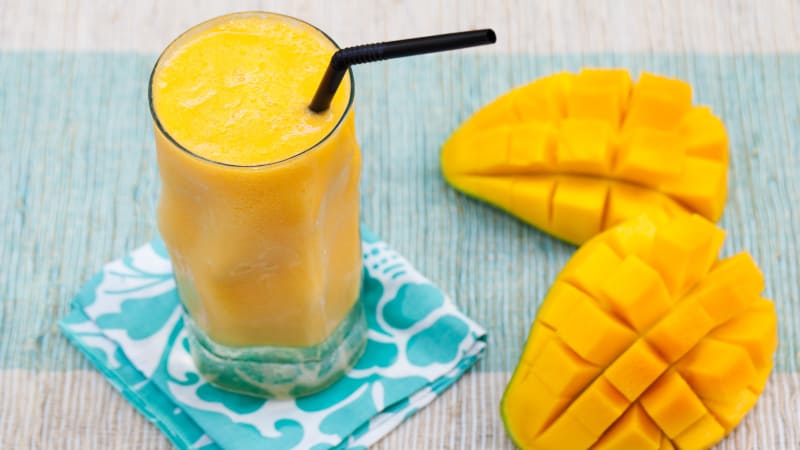
Mango juice contains 50 kcal per 100 ml. However, the lower calorie content in comparison with the whole fruit should not be misleading: the juice contains more carbohydrates (up to 14 g), it has practically no fiber.
Dried mango has a high concentration of sugars, which increases the calorie content of the product - 314 kcal per 100 g. Jam from this fruit is slightly less calories (260 kcal per 100 g), but added sugar during cooking does not increase the product's benefits.
The same applies to canned mango: although the energy and nutritional value is close to that of a fresh fruit (64 kcal and 14 g of carbohydrates), the vitamin and mineral composition becomes noticeably poorer during processing.
Is mango suitable for losing weight and in what form
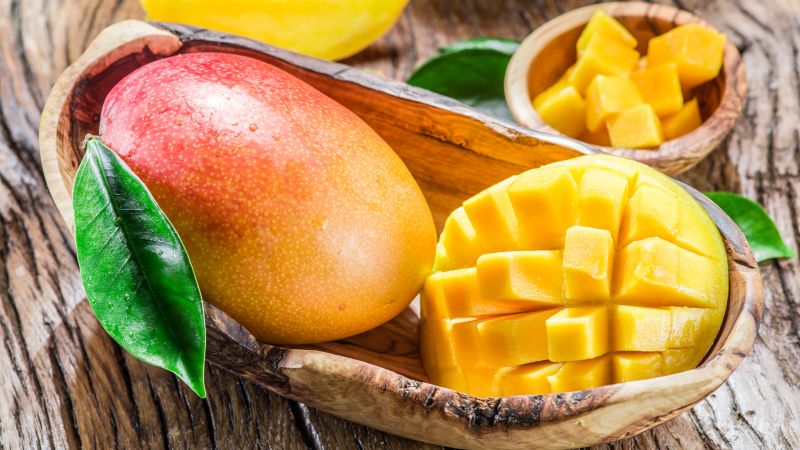
Mango is a faithful companion in the fight against excess weight:
- it contains few calories and practically does not contain fat (less than 1%);
- due to natural sugars in the composition, it dulls cravings for sweets;
- its use removes excess fluid from the body;
- fruit improves digestion and stimulates metabolic processes.
A significant drawback of the product is the lack of protein (the main building material of the body's cells). What is the best way to eat mango on a diet? To compensate for protein deficiencies, nutritionists recommend eating the fruit with low-fat dairy products or adding it to lean meats, poultry, and fish. So, as a light snack, a milky-mango smoothie is suitable, and for dinner - a chicken breast with vegetables and fruits.
The benefits and harms of mango
In countries where this exotic fruit grows, it is widely used for medicinal purposes. Useful properties of mango:
- strengthens the immune system;
- relieves nervous tension and improves mood;
- has an antioxidant effect;
- stimulates the activity of the kidneys and intestines;
- strengthens blood vessels, stops bleeding;
- lowers cholesterol levels;
- indicated for visual impairment;
- regulates blood pressure;
- prevents dehydration (maintains electrolyte, water and acid-base balance);
- considered a natural aphrodisiac.
Contraindications
Despite the impressive list of beneficial effects, the fruit has contraindications and restrictions for use:
- has a strong allergenic effect;
- immature causes indigestion, intestinal colic;
- excessive consumption leads to constipation and fever;
- in combination with alcohol irritates the gastric mucosa.
The recommended daily allowance is no more than 2 fruits per day.
They treat unripe fruits with extreme caution, as their peel contains the oily toxin urushiol. The same substance is found in cashews, which is why pickers of mangoes and nuts use gloves when handling them.
How to choose and store correctly
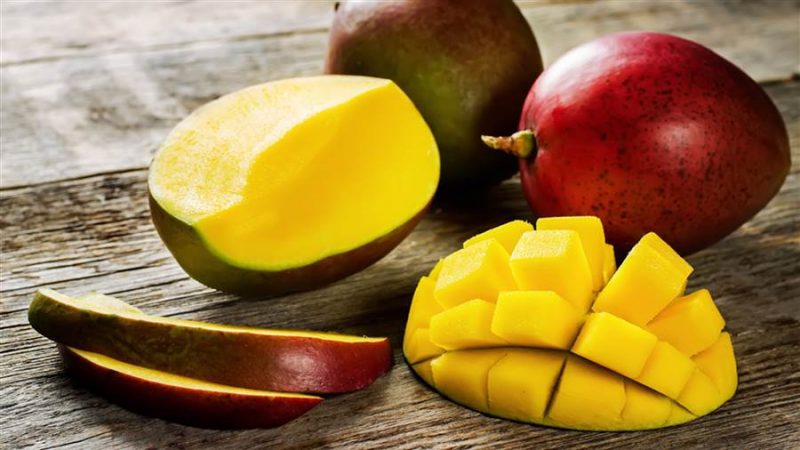
Fruits intended for import are harvested not yet ripe so that they do not spoil during transportation. Therefore, Russian stores often sell "green" (in terms of ripeness) mangoes. However, it is not always wise to focus solely on the color of the peel, because there are more than 300 varieties of mangoes and each of them has its own color, including dark green. The most reliable sign of fruit ripeness is its smell.
To choose a sufficiently ripe but unspoiled mango, they are guided by the following criteria:
- The aroma should be strong, sweet. Alcoholic notes indicate that fermentation has begun in the fruit.
- Smooth skin with a characteristic glossy sheen and small brown blotches is preferred. If the fruit is covered with a network of fine wrinkles, it is most likely overripe and will not be stored for a long time.
- If you press on the fruit, the dent should quickly heal... Loss of firmness is characteristic of mango starting to spoil.
Sometimes it is better to buy a slightly unripe fruit than an overexposed one, since it will not be difficult to bring it "to condition" at home. To do this, the fruit is wrapped in paper or a dry cloth and left in a dark place for a couple of days.
Important! Mango is sensitive to cold, so for it storage requires a temperature not lower than + 10 ... + 13 ° C and a humidity of about 90–95%. Under these conditions, the fruit remains fresh for up to 30 days.
Only those fruits that have already been cut are sent to the refrigerator, their shelf life is 24 hours. To prevent the cut and skin from darkening, sprinkle the mango with lemon juice and wrap it with cling film.
If you cannot finish eating the fruit in a day, it is better to freeze it or add it to the jam. Frozen mango is stored without loss of taste and useful properties for 2-3 months.
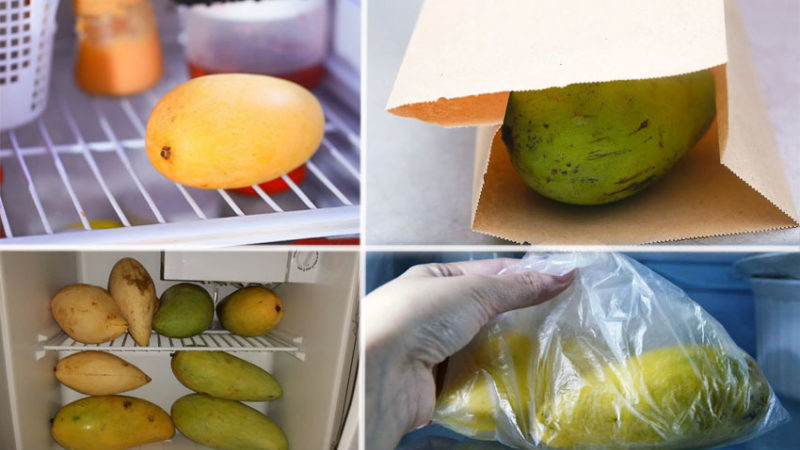
Conclusion
Mango is not in vain that it enjoys love and recognition in different parts of the world.In hot countries, this tasty and juicy fruit prevents dehydration, and in the conditions of the Russian winter, it replenishes the supply of vitamins, especially ascorbic acid. The fruit contains few calories and is suitable for dietary nutrition, but it is better to combine it with protein products.
A sure way to pick a ripe fruit is by smelling. Unripe mango is brought to the desired state at room temperature, protected from light.